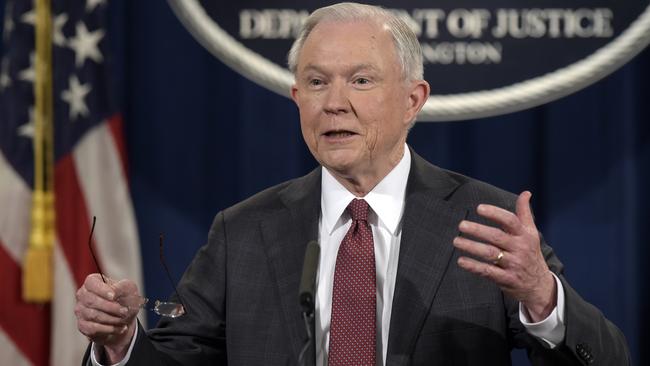Donald Trump ramps up the anti-Mueller rhetoric
The President’s attack on Attorney-General Jeff Sessions is part of a campaign to escalate pressure on the Mueller investigation.

Donald Trump’s attack on US Attorney-General Jeff Sessions yesterday is the latest in a broad campaign to escalate pressure on the Mueller investigation.
It comes after a wild few days in which the US President pumped out more that a dozen tweets railing against special counsel Robert Mueller’s investigation into alleged Russian involvement in Mr Trump’s 2016 election campaign.
Yesterday, Mr Trump renewed his regular attacks on Mr Sessions when he tweeted “I wish I did” pick somebody else as the attorney-general.
A day earlier it emerged Mr Trump had asked Mr Sessions in March last year to reverse his decision to recuse himself from the Russian investigation.
Mr Sessions refused.
The President saw Mr Sessions’s recusal as disloyalty and blamed that decision for events that ended with Deputy Attorney-General Rod Rosenstein appointing Mr Mueller as special counsel last May.
As Mr Trump gears up for the November mid-term elections, he is stepping up the assault on Mr Mueller and his team, whom he describes as “the 13 Angry and heavily conflicted Democrats”.
The President’s central message — that the FBI and Mr Mueller are politically tainted — is being delivered via tweets to his heartland each day.
The new aspect of Mr Trump’s push is to promote the controversy he has dubbed “Spygate” as evidence that the FBI was doing the bidding of the Democrats and president Barack Obama in 2016.
This revolves around the activities of an FBI informant during the campaign, University of Cambridge professor Stefan Halper, who met several Trump campaign advisers to ask them about their contacts with Russians.
Mr Trump says this amounts to the insertion of “spies” into his campaign by the FBI, sanctioned by the Obama administration.
“Can anyone even imagine having Spies placed in a competing campaign, by the people and party in absolute power, for the sole purpose of political advantage and gain?” he tweeted.
In another tweet Mr Trump said: “Starting to look like one of the biggest scandals in US history. SPYGATE — a terrible thing!”
Mr Rosenstein has responded to the President’s claims by broadening an inspector-general investigation to include whether there was “any impropriety or political motivation” in the FBI’s use of the informant.
This week, the President’s chief lawyer, Rudy Giuliani, said Mr Trump would not agree to an interview with Mr Mueller unless the Republican’s legal team could review documents about the FBI’s use of the informant.
Last week, a small number of congress members were briefed by the FBI and the Justice Department about the informant. One of those at the briefing, Republican Trey Gowdy, contradicted the President, saying he heard no evidence that a “spy” was inserted into the campaign or that the informant behaved inappropriately.
“I am even more convinced that the FBI did exactly what my fellow citizens would want them to do when they got the information they got and that it has nothing to do with Donald Trump,” said Mr Gowdy, a Trump ally and House oversight committee chairman. “Informants are used all day, every day by law enforcement.”
Mr Trump also stepped up his attack on the Mueller probe this week by claiming prosecutors planned to meddle in the mid-term elections.
“The 13 Angry Democrats (plus people who worked 8 years for Obama) working on the rigged Russia Witch Hunt will be MEDDLING with the midterm elections, especially now that Republicans (stay tough!) are taking the lead in the polls. There was no Collusion, except by the Democrats,” Mr Trump tweeted.
Mr Mueller will seek to avoid releasing his final report too close to the mid-terms, which means he will have to finish it in the next few months or wait until after.




To join the conversation, please log in. Don't have an account? Register
Join the conversation, you are commenting as Logout